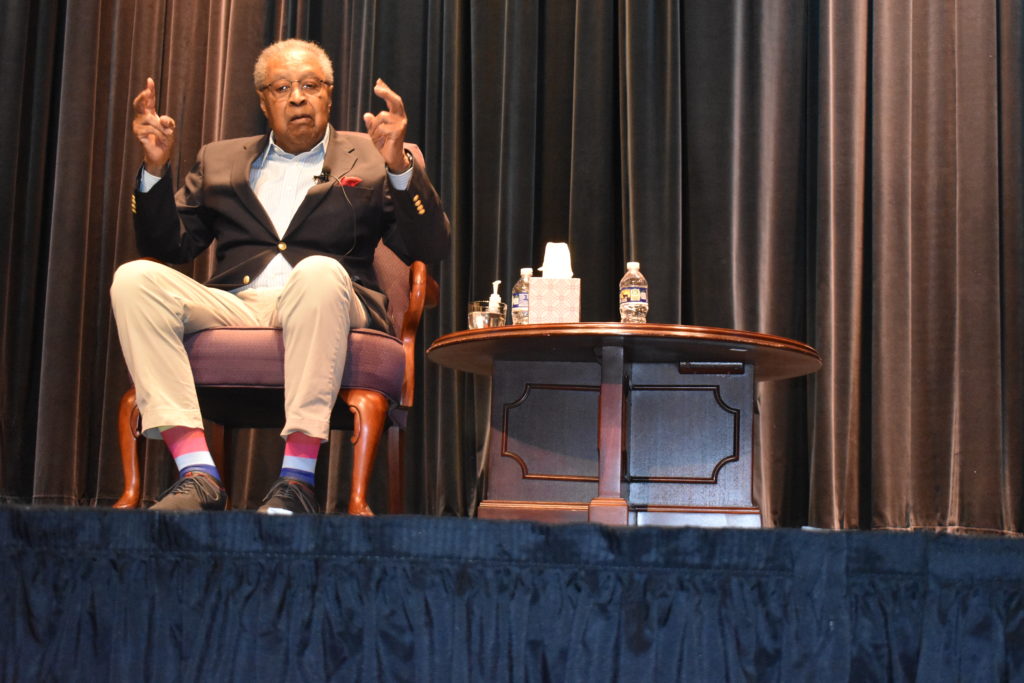
A sense of awe and respect permeated the Dennis Flyer Theater at Camden County College last week as Dr. Clarence B. Jones came on stage singing a soulful, spiritual song about freedom.
Soon, the nearly 200 people in attendance sang with him.
“I am so delighted to be back home. As a little boy in Cinnaminson Township, I remember succotash, sweet corn and fresh tomatoes,” said Jones, a civil rights icon who co-authored Dr. Martin Luther King Jr.’s famous “I Have a Dream” speech delivered at the March on Washington in August of 1963.
The Palmyra High School Class of 1949 valedictorian recalled that his parents were domestic servants working as a chauffeur and maid for the Lippincott family in Riverton. They sent Clarence to a boarding school in Philadelphia at age 6, an experience “that defined who I am,” Jones told the college audience.
Every day until he was 14, the Irish Catholic nuns told him, “Be a good boy. We love you. Jesus loves you. You are beautiful.”
“That implanted the sense that I am somebody deep into my spine,” Jones added.
When he returned home and attended Palmyra High, the school was 70% white.
“I was voted president of the honor society and most likely to succeed by the students.”
Jones credited the nuns at boarding school for encouraging him be educated, and went on to graduate from Columbia College and earn his law degree from Boston University. He moved to California and became a reknowned copyright attorney, helping songwriters who claimed their music was stolen by other artists.
One day, a friend asked him to help Dr. King fight a tax evasion charge filed by the state of Alabama in 1960. Jones wondered why he should help King “just because he got his hand stuck in the candy jar.”
Then King came to his door.
“I turned him down,” Jones recalled. “Then he asked me to come hear him speak at the largest Baptist Church in Los Angeles. It was like the Black version of Beverly Hills.
“I was mesmerized. What does this Baptist preacher know about the Magna Carta,” thought Jones, who said King then changed a poem by Langston Hughes and “put the words in my mother’s mouth.
“I started crying.”
“After the service, I said, ‘Dr. King, when do you want me to go to Montgomery?'” Jones remembered. From that point on, the two men became great friends and leaders in the Black movement.
While working side by side with the Southern Christian Leadership Conference (SCLC) to mobilize large, non-violent protests in place like Birmingham and Selma in Alabama, Jones learned that his father had died. He went back home for the funeral at Mt. Zion AME Church in Riverton.
Someone came into the church and said, “Dr. Jones, Martin Luther King Jr. is here and he wants to speak,'” Jones noted.
“I said he doesn’t know my father.”
Yet, Dr. King did end up speaking at the funeral.
“I know my friend Brother Clarence is probably surprised that I am here,” King told the churchgoers. “I did not know the deceased, (Jones’ father), Goldsborough Benjamin Jones, but I know his son.”
“I was dumbfounded,” Jones told his audience as he wiped a tear away at the memory, adding that King went on to praise his friend’s work fighting for civil rights. “You never said all those nice things about me before,” he told King after the service.
As for speechwriting, it is important to have “the ability to retain the sound of the voice of the person making the speech,” Jones explained.
And on Aug. 28, 1963, in front of the Lincoln Memorial, the voice of King delivered one of the best speeches ever written.
“I have a dream that my four little children will one day live in a nation where they will not be judged by the color of their skin but by the content of their character,” King thundered. “I have a dream today.
“When we allow freedom to ring, when we let it ring from every village and every hamlet, from every state and every city, we will be able to speed up that day when all of God’s children, Black men and white men, Jews and Gentiles, Protestants and Catholics, will be able to join hands and sing in the words of the old Negro spiritual: ‘Free at last. Free at last. Thank God almighty, I’m free at last.'”
As for the future, Jones, who is 92 years young, said he soon plans to leave Stanford University and come home to South Jersey.”
Meanwhile he is promoting his newest book, “Last of the Lions,” and is concerned about gun violence in the United States.
“My belief is that the most current existential threat to the progress of our people is 24/7, non-stop gun violence in cities like Philadelphia, San Francisco and Birmingham,” Jones noted.
“There is so much wasted talent,” he added, using the term “Black killing fields.”
“We collectively have a fundamental question: Are we going to die in violence or live in peace?”
For 92 plus years, Jones has chosen peace and non-violence.









